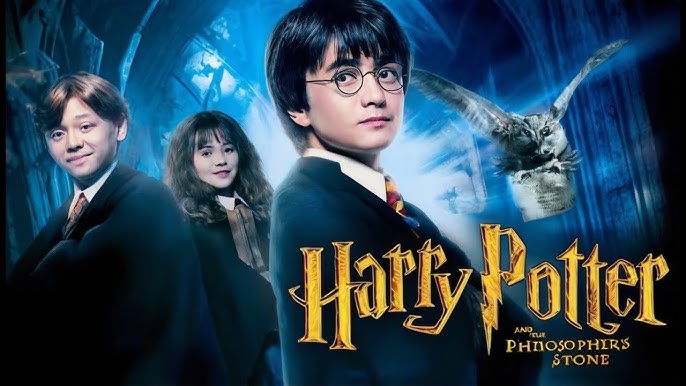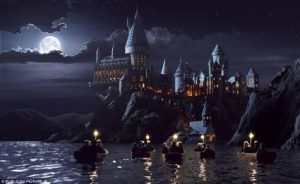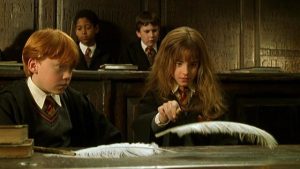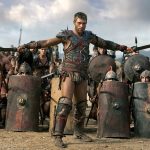“Harry Potter And The Philosopher’s Stone 2001”
- movieslovers
- November 14, 2024

“Harry Potter and the Philosopher’s Stone” (2001), also known as Harry Potter and the Sorcerer’s Stone in some regions, is a fantasy film directed by Chris Columbus and based on J.K. Rowling‘s immensely popular novel of the same name. It is the first installment in the Harry Potter film series and introduces audiences to the magical world of witches, wizards, and magical creatures. The movie set the tone for the entire franchise, which would go on to become one of the highest-grossing film series of all time.
Plot Summary
The film follows Harry Potter (Daniel Radcliffe), an orphaned boy who has lived a miserable life with his abusive aunt, uncle, and cousin, the Dursleys. Harry is unaware of his true heritage until his eleventh birthday when he receives a letter informing him that he is a wizard and has been accepted to attend Hogwarts School of Witchcraft and Wizardry.
At Hogwarts, Harry learns that he is famous in the wizarding world for surviving an attack by the dark wizard Lord Voldemort, who killed his parents when Harry was just a baby. As Harry begins his studies at Hogwarts, he befriends Hermione Granger (Emma Watson) and Ron Weasley (Rupert Grint), who become his closest companions. Together, they discover that there is a magical object called the Philosopher’s Stone (which grants immortality) hidden at Hogwarts.
As the students investigate, they uncover the truth about the Stone and the dark forces that want to use it for nefarious purposes. Harry, Ron, and Hermione eventually confront Professor Quirrell (Ian Hart), who is possessed by Voldemort, and prevent Voldemort from obtaining the Stone. In the process, Harry learns more about his parents’ past, the events that led to Voldemort’s downfall, and his own destiny.
Key Themes
- Friendship and Loyalty: One of the central themes of Harry Potter and the Philosopher’s Stone is the importance of friendship. The strong bond between Harry, Ron, and Hermione is essential in solving the mysteries surrounding the Philosopher’s Stone. Their loyalty to each other, as well as their willingness to risk their lives to protect one another, plays a crucial role in the story’s progression.
- The Power of Love: The film introduces the idea that love, especially a mother’s love, has the power to protect and save. Harry’s survival of Voldemort’s attack when he was an infant is due to the sacrificial love of his mother, Lily Potter, who gave her life to save him. This theme of love as a source of strength continues throughout the series.
- Courage and Self-Discovery: Harry’s journey in this film is one of self-discovery. He learns about his identity as a wizard and the significance of his survival against Voldemort. Harry’s courage in the face of danger, particularly when he faces off against Quirrell and Voldemort, reveals his inner strength and determination. The film emphasizes the idea that true bravery is not the absence of fear but the willingness to face it.
- Good vs. Evil: The battle between good and evil is a major theme throughout the film and the entire series. Voldemort, the embodiment of evil, seeks power and immortality, while Harry, representing the forces of good, has the responsibility of stopping him. The contrast between Harry’s humble and selfless nature and Voldemort’s obsession with power is highlighted as a key element of the story.
- Destiny and Choice: While the film touches on the concept of fate, particularly with Harry being marked by the prophecy of Voldemort’s defeat, it also emphasizes the importance of choice. Throughout the film, Harry makes decisions that reflect his character, particularly when he chooses to risk his life to prevent Voldemort from obtaining the Philosopher’s Stone, despite having every reason to stay safe.
Character Development and Performances
- Harry Potter (Daniel Radcliffe): Daniel Radcliffe’s portrayal of Harry marks the beginning of his journey as the titular hero of the series. In this first film, Harry is depicted as an innocent, wide-eyed boy who is unaware of his magical legacy but is quick to adapt and prove his bravery. Radcliffe captures the vulnerability and growing confidence of Harry, setting the foundation for his character’s development in the later films.
- Hermione Granger (Emma Watson): Hermione is introduced as an intelligent, book-smart student with a penchant for knowledge and perfection. Emma Watson brings Hermione’s quick wit and determined nature to life, and her character’s growth throughout the film is evident. She starts off as a know-it-all but quickly becomes a loyal and reliable friend to Harry and Ron.
- Ron Weasley (Rupert Grint): Ron is the comic relief but also provides great emotional support for Harry and Hermione. Rupert Grint plays Ron with warmth and sincerity, highlighting his loyalty and courage, even if he often feels overshadowed by his more famous friends. Ron’s humorous but brave nature is a key element in the trio’s dynamic.
- Professor Dumbledore (Richard Harris): Richard Harris portrays Professor Albus Dumbledore, the wise and kind headmaster of Hogwarts. Dumbledore is a guiding figure for Harry, offering wisdom and cryptic advice. Harris’s portrayal captures the warmth and mystery of Dumbledore, establishing him as a moral compass and mentor for Harry throughout the series.
- Professor McGonagall (Maggie Smith): Maggie Smith brings Professor Minerva McGonagall to life with a sharp, no-nonsense attitude, yet a deep care for her students. McGonagall’s character provides both discipline and a sense of protection for Harry and the other students.
- Lord Voldemort / Quirrell (Ian Hart): Ian Hart plays Professor Quirrell, who is revealed to be under the influence of the dark wizard Lord Voldemort. Though Voldemort does not appear fully in his physical form, his presence looms over the entire film, and Quirrell’s transformation into a pawn of Voldemort showcases the manipulative nature of the dark wizard.

Cinematography and Direction
The film’s cinematography, handled by John Seale, does an excellent job of creating a magical atmosphere that feels both whimsical and dark. The set designs, particularly the Hogwarts Castle and the various magical environments, are beautifully crafted to capture the grandeur of J.K. Rowling’s world. The film uses a mix of traditional sets and CGI to create the fantastical elements of the story, from the moving staircases to the enchanted objects.
Director Chris Columbus creates a faithful adaptation of the beloved book, bringing the magical world to life with a sense of wonder and adventure. The pacing of the film balances the introduction of the characters and the world with the build-up to the central conflict involving the Philosopher’s Stone. Columbus’s direction ensures that the film feels like both an introduction to the series and a complete story in itself.
Music and Soundtrack
The score, composed by John Williams, is iconic and has become synonymous with the Harry Potter franchise. Williams’s music captures the magical and adventurous spirit of the film, with sweeping orchestral compositions and memorable themes, such as the main title theme, which is instantly recognizable. The music plays a significant role in creating the atmosphere of Hogwarts and the magical world, while also heightening key emotional and dramatic moments.
Reception and Legacy
Upon release, Harry Potter and the Philosopher’s Stone was met with widespread critical acclaim and commercial success. The film grossed over $1 billion worldwide, making it one of the highest-grossing films of all time. Critics praised its faithfulness to the book, as well as the performances of the young cast and the film’s ability to bring the magic of the books to the screen.
The film’s success marked the beginning of a massive franchise, with eight films in total, and it introduced a new generation of moviegoers to the world of Harry Potter. It is often regarded as one of the most faithful book-to-film adaptations in cinema history.
In addition to its critical and commercial success, Harry Potter and the Philosopher’s Stone has had a lasting cultural impact. It introduced audiences to J.K. Rowling’s beloved characters, themes, and magical world, creating a global fanbase that continues to grow today.
Fun Facts
- Casting the Trio: The casting of Daniel Radcliffe as Harry, Emma Watson as Hermione, and Rupert Grint as Ron was crucial to the film’s success. The young actors were relatively unknown at the time, and their chemistry together helped bring the trio’s friendship to life on screen. They went through an extensive audition process to land their roles.
- Filming Locations: Hogwarts was primarily filmed at several iconic British locations, including Durham Cathedral and Alnwick Castle. Many of the iconic interior shots, like the Great Hall, were created on elaborate sets at Leavesden Studios.
- A Major Franchise: The success of the film led to seven more films in the series, the last of which, Harry Potter and the Deathly Hallows: Part 2, was released in 2011. The films together make up one of the highest-grossing movie franchises in history.
Conclusion
Harry Potter and the Philosopher’s Stone (2001) is a charming, magical, and faithful adaptation of J.K. Rowling’s beloved book series. Its success marked the beginning of one of the most iconic film franchises in cinematic history. With strong performances from the cast, excellent direction by Chris Columbus, and a stunning musical score by John Williams, the film captures the wonder of the wizarding world while introducing the rich, layered characters and themes that would continue to evolve throughout the series. The film is not just an introduction to Harry Potter’s world but a timeless classic that continues to inspire and entertain audiences of all ages.











